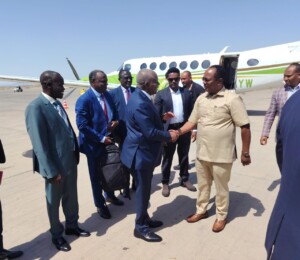Transitional Military Council trades threats with demonstrators
Demonstrators outside Khartoum Army Headquarters were warned by the interim Transitional Military Council (TMC) to stop blocking roads and limiting the movement of citizens on Monday.
 Demonstrators calling for a transition to civilian government show their anger during Khartoum sit-in in April 2019 (social media)
Demonstrators calling for a transition to civilian government show their anger during Khartoum sit-in in April 2019 (social media)
Demonstrators outside Khartoum Army Headquarters were warned by the interim Transitional Military Council (TMC) to stop blocking roads and limiting the movement of citizens on Monday.
The TMC also said it was unacceptable that some young people are acting as police and security services, in violation of the law. This refers to reports that people have been searching demonstrators as they join in sit-in. “We request the honourable citizens to help clear these negative features that impact the lives of citizens and the security of the country,” the TMC said in a statement, adding that roads and access ways for public transportation must “be opened immediately”.
The TMC and demonstrators have been exchanging remarks since Sunday morning. Yesterday, demonstrators calling for transition from a military to civilian council, following the deposition of Omar al Bashir as president of the country, announced that talks have been suspended until particular demands are met.

in front of Khartoum Army Headquarters on 21 April 2019 (Al Jazeera)
As hundreds of thousands of protestors gathered at the sit-in within army headquarters, spokesperson for the Sudan Professionals Association, Mohamed El Amin, declared that a list of names for a civilian transitional council would not be announced, as previously thought. Instead, he said that “we will continue with the sit-in and have suspended talks with the military council. We will escalate the revolution on the streets through protest schedules, until our demands are implemented.” The association’s demands are delineated under the Declaration of Freedom and Change, and include the removal of the elements of the ousted regime from the Council, namely Gen Omar Zeinelabdin, Jalaleldin El Sheikh and El Tayeb Babikir and the recognition of the forces of Freedom and Change as the sole representative of the revolutionary movement.
In a separate statement, the council said: “We will not accept the replacement of military rule by another military rule… The Military Council is working today to prevent the handover of power to the civilians, to keep the authority as the legitimate representative of the protesters, and to re-produce the former regime.”
The Sudanese Professionals Association sent out an “urgent appeal” to “all Sudanese” to come to the sit-in in front of the General Command to continue to uproot the former regime.
Why is the military delaying?
On Sunday evening, the military council spokesperson Lt Gen Shamseldin Kabbashi Shinto told a separate press conference they are studying 124 proposals submitted by 214 political party and national figures for the transitional period.
He further repeated statements made by the head of the military council, Gen Abdelfattah El Burhan, on Sunday morning saying they are keen to reconcile all the Sudanese and to not exclude anyone.
He stressed that there are many points of convergence with the political forces and they only disagree on a few points that need to be overcome, after which they will declare a civilian transitional government.
What is the position of opposition parties?
In a statement released on Sunday, the Sudanese Communist Party said "the military junta emanates from the core of the former Islamist regime and accused the transitional council of working to deviate the uprising from its goals to reproduce the former regime".
Earlier, the Sudan People’s Liberation Movement-North (SPLM-N) deputy chairman and Sudan Call Secretary-General, Yasir Arman, pointed out that the head of the political committee and his deputy are two Islamists working to reproduce the old regime, and called for their dismissal.
Commentators maintain that, at present, there is no sign of major splits within the opposition, although there have been divisions over the approach to be taken towards the military council.











 and then
and then